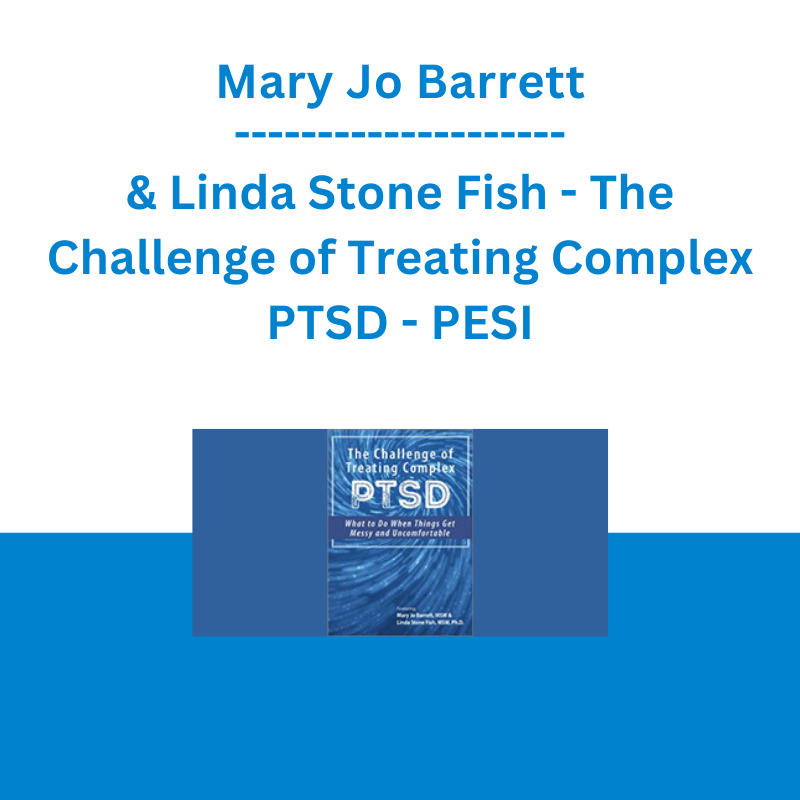*** Proof of Product ***
Exploring the Essential Features of “Mary Jo Barrett & Linda Stone Fish – The Challenge of Treating Complex PTSD: What to do When Things Get Messy and Uncomfortable – PESI”
Speakers: Linda Stone Fish, MSW, PhD | Mary Jo Barrett, MSW
Duration: 3 Hours 50 Minutes
Format: Audio and Video
Copyright: Mar 17, 2016
Media Type: Digital Seminar
Description
When working with trauma cases do you often see clients go into flight, fight, and/or freeze? Do they yell at you, insult you, or leave the session? Are there times you find yourself angry at your clients or just downright don’t like them? Do you recognize your own flight, fight, and/or freeze response? Welcome to the messy, often confusing world of trauma treatment. In this workshop, you’ll explore practical in-session techniques as well as a framework to help you recognize what’s happening when things heat up and get intense.
- Focus on how to assess the client’s motivation, stage of change, and preferred mode of learning and how to build a therapeutic collaboration around it
- Explore the importance of therapist transparency and how to empower clients by making the therapy process as safe and explicit as possible
- Learn how to explore intra-family violence or include additional family members in your sessions
Speakers
Linda Stone Fish, MSW, PhD
Linda Stone Fish, MSW, PhD., is the David B. Falk Endowed Professor of Marriage and Family Therapy at Syracuse University and the author of Nurturing Queer Youth.
Speaker Dislcosures:
Financial: Linda Stone Fish is in private practice. She is a David B. Falk Endowed Professor at Syracuse University. She has no relevant financial relationships with ineligible organizations.
Non-financial: Linda Stone Fish is a member of the American Family Therapy Association.
Mary Jo Barrett, MSW
Mary Jo Barrett, MSW, is the founder and director of the Center for Contextual Change, and the coauthor of Treating Complex Trauma: A Relational Blueprint for Collaboration and Change and Systemic Treatment of Incest.
Speaker Disclosures:
Financial: Mary Jo Barrett is the founder and director of the Center for Contextual Change. She has no relevant financial relationships with ineligible organizations.
Non-financial: Mary Jo Barrett has no relevant non-financial relationship to disclose.
Outline
Introduction and overview of collaborative change model for trauma treatment
- Introduction to collaborative change as a “meta-model” to other trauma therapies
- Discussion how collaborative change model can help therapists overcome being stuck
Experiencing collaborative change therapy with trauma
- In-depth study of the concept of ethical attunement
- Workshop between participants to discuss techniques
- Clinical feedback examples to support collaborative change model of therapy
- Review of collaboration change model and lesson on techniques how to apply it to other models of therapy
Concluding remarks and question and answer session
- Presenters answer specific questions about trauma model
- Final consolidation exercise to use with clients
Target Audience
Addiction Counselors, Psychologists, Counselors, Social Workers, Marriage & Family Therapists, Nurses, and other Behavioral Health Professionals
Objectives
- Describe how to assess the client’s motivation, stage of change, and preferred mode of learning to improve treatment outcomes.
- Articulate the importance of therapist transparency to improve client engagement
- Articulate strategies to help empower clients in session
- Explore intra-family violence and its clinical implications
Please see the full list of alternative group-buy courses available here: https://lunacourse.com/shop/










 Fred Haug - Virtual Wholesaling Simplified
Fred Haug - Virtual Wholesaling Simplified  Julie Stoian & Cathy Olson - Launch Gorgeous - Funnel Gorgeous Bundle
Julie Stoian & Cathy Olson - Launch Gorgeous - Funnel Gorgeous Bundle  Matan Feldman - The 13-Week Cash Flow Modeling - Wall Street Prep
Matan Feldman - The 13-Week Cash Flow Modeling - Wall Street Prep  Team NFT Money - Ultimate NFT Playbook
Team NFT Money - Ultimate NFT Playbook  Sovereign Man Confidential - Renunciation Video
Sovereign Man Confidential - Renunciation Video  Jesse Livermore Trading System - Joe Marwood
Jesse Livermore Trading System - Joe Marwood  George Fontanills & Tom Gentile - Optionetics Wealth Without Worry Course
George Fontanills & Tom Gentile - Optionetics Wealth Without Worry Course  Chris Capre - Advanced Price Action Ongoing Training & Webinars
Chris Capre - Advanced Price Action Ongoing Training & Webinars  Alphashark - The AlphaShark SV-Scalper
Alphashark - The AlphaShark SV-Scalper  Akil Stokes & Jason Graystone - TierOneTrading - Trading Edge 2019
Akil Stokes & Jason Graystone - TierOneTrading - Trading Edge 2019  Greg Loehr - Advanced Option Trading With Broken Wing Butterflies
Greg Loehr - Advanced Option Trading With Broken Wing Butterflies  Atlas API Training - API 570 Exam Prep Training Course
Atlas API Training - API 570 Exam Prep Training Course  Emanuele Bonanni - My Trading Way
Emanuele Bonanni - My Trading Way  Useful Genetics Part I - University of British Columbia
Useful Genetics Part I - University of British Columbia  SMB - Options Training
SMB - Options Training  Toshko Raychev - Profit System + ITF Assistant
Toshko Raychev - Profit System + ITF Assistant  Crypto Dan - The Crypto Investing Blueprint To Financial Freedom By 2025
Crypto Dan - The Crypto Investing Blueprint To Financial Freedom By 2025